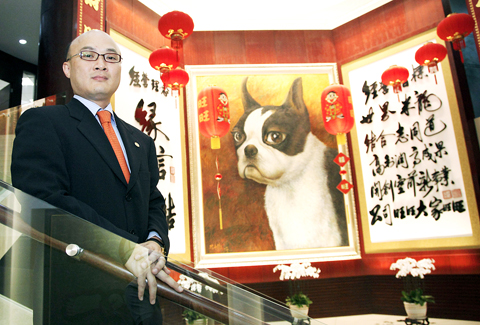Want Want China Holdings Ltd (中國旺旺控股), the foodmaker controlled by Taiwanese billionaire Tsai Eng-meng (蔡衍明), will shun acquisitions and tie-ups to focus on sales in China and its existing range of more than 3,000 trademarks.
“We are standing in a great position,” chief financial officer Everett Chu (朱紀文) said in an interview in Shanghai yesterday. “For the foreseeable future, we would rather try it on our own.”
Want Want, the largest maker of rice crackers in China, expects the country to be its main market for the next decade at least as growth boosts consumer spending among the nation’s 1.3 billion population, Chu said.

PHOTO: BLOOMBERG
China’s economy expanded 7.9 percent last quarter as a 4 trillion yuan (US$595 billion) stimulus package helped it withstand the global recession.
“For food and beverage company, if you have the population, then you have market potential,” Chu said. “We believe this sector will be one of the fastest-growing in China.”
Want Want plans to create new products using existing brands to boost sales, as well as expanding distribution networks in rural China, he said. He wouldn’t comment on sales targets.
Want Want earns more than a third of its revenue from selling rice crackers and the rest from snacks foods, dairy products and drinks. Its trademarks are spread across China, Taiwan, Hong Kong and Macau.

Quanta Computer Inc (廣達) chairman Barry Lam (林百里) is expected to share his views about the artificial intelligence (AI) industry’s prospects during his speech at the company’s 37th anniversary ceremony, as AI servers have become a new growth engine for the equipment manufacturing service provider. Lam’s speech is much anticipated, as Quanta has risen as one of the world’s major AI server suppliers. The company reported a 30 percent year-on-year growth in consolidated revenue to NT$1.41 trillion (US$43.35 billion) last year, thanks to fast-growing demand for servers, especially those with AI capabilities. The company told investors in November last year that

Intel Corp has named Tasha Chuang (莊蓓瑜) to lead Intel Taiwan in a bid to reinforce relations between the company and its Taiwanese partners. The appointment of Chuang as general manager for Intel Taiwan takes effect on Thursday, the firm said in a statement yesterday. Chuang is to lead her team in Taiwan to pursue product development and sales growth in an effort to reinforce the company’s ties with its partners and clients, Intel said. Chuang was previously in charge of managing Intel’s ties with leading Taiwanese PC brand Asustek Computer Inc (華碩), which included helping Asustek strengthen its global businesses, the company

Taiwanese suppliers to Taiwan Semiconductor Manufacturing Co. (TSMC, 台積電) are expected to follow the contract chipmaker’s step to invest in the US, but their relocation may be seven to eight years away, Minister of Economic Affairs J.W. Kuo (郭智輝) said yesterday. When asked by opposition Chinese Nationalist Party (KMT) Legislator Niu Hsu-ting (牛煦庭) in the legislature about growing concerns that TSMC’s huge investments in the US will prompt its suppliers to follow suit, Kuo said based on the chipmaker’s current limited production volume, it is unlikely to lead its supply chain to go there for now. “Unless TSMC completes its planned six

TikTok abounds with viral videos accusing prestigious brands of secretly manufacturing luxury goods in China so they can be sold at cut prices. However, while these “revelations” are spurious, behind them lurks a well-oiled machine for selling counterfeit goods that is making the most of the confusion surrounding trade tariffs. Chinese content creators who portray themselves as workers or subcontractors in the luxury goods business claim that Beijing has lifted confidentiality clauses on local subcontractors as a way to respond to the huge hike in customs duties imposed on China by US President Donald Trump. They say this Chinese decision, of which Agence